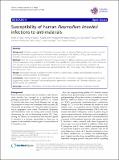Files in this item
Susceptibility of human plasmodium knowlesi infections to anti-malarials
Item metadata
| dc.contributor.author | Fatih, Farrah A. | |
| dc.contributor.author | Staines, Henry M. | |
| dc.contributor.author | Siner, Angela | |
| dc.contributor.author | Ahmed, Mohammed Atique | |
| dc.contributor.author | Woon, Lu Chan | |
| dc.contributor.author | Pasini, Erica M. | |
| dc.contributor.author | Kocken, Clemens H. M. | |
| dc.contributor.author | Singh, Balbir | |
| dc.contributor.author | Cox Singh, Janet | |
| dc.contributor.author | Krishna, Sanjeev | |
| dc.date.accessioned | 2014-05-06T14:31:00Z | |
| dc.date.available | 2014-05-06T14:31:00Z | |
| dc.date.issued | 2013-11-19 | |
| dc.identifier | 116323332 | |
| dc.identifier | df24b405-4907-4da4-bdab-50098177aeb9 | |
| dc.identifier | 000329105900001 | |
| dc.identifier | 84887716187 | |
| dc.identifier.citation | Fatih , F A , Staines , H M , Siner , A , Ahmed , M A , Woon , L C , Pasini , E M , Kocken , C H M , Singh , B , Cox Singh , J & Krishna , S 2013 , ' Susceptibility of human plasmodium knowlesi infections to anti-malarials ' , Malaria Journal , vol. 12 , 425 . https://doi.org/10.1186/1475-2875-12-425 | en |
| dc.identifier.issn | 1475-2875 | |
| dc.identifier.other | ORCID: /0000-0003-4878-5188/work/64034464 | |
| dc.identifier.uri | https://hdl.handle.net/10023/4712 | |
| dc.description | This study was funded by the Medical Research Council (MRC) UK; Grant number G0801971 and the European Community’s Seventh Framework Programme (FP7/2007-2013), EVIMALAR network of Excellence under grant agreement N° 242095 and NANOMAL under grant agreement N° 304948 | en |
| dc.description.abstract | Background: Evidence suggests that Plasmodium knowlesi malaria in Sarawak, Malaysian Borneo remains zoonotic, meaning anti-malarial drug resistance is unlikely to have developed in the absence of drug selection pressure. Therefore, adequate response to available anti-malarial treatments is assumed. Methods: Here the ex vivo sensitivity of human P. knowlesi isolates in Malaysian Borneo were studied, using a WHO schizont maturation assay modified to accommodate the quotidian life cycle of this parasite. The in vitro sensitivities of P. knowlesi H strain adapted from a primate infection to in vitro culture (by measuring the production of Plasmodium lactate dehydrogenase) were also examined together with some assays using Plasmodium falciparum and Plasmodium vivax. Results: Plasmodium knowlesi is uniformly highly sensitive to artemisinins, variably and moderately sensitive to chloroquine, and less sensitive to mefloquine. Conclusions: Taken together with reports of clinical failures when P. knowlesi is treated with mefloquine, the data suggest that caution is required if using mefloquine in prevention or treatment of P. knowlesi infections, until further studies are undertaken. | |
| dc.format.extent | 7 | |
| dc.format.extent | 439207 | |
| dc.language.iso | eng | |
| dc.relation.ispartof | Malaria Journal | en |
| dc.subject | Artemisinin | en |
| dc.subject | Artemether | en |
| dc.subject | Artesunate | en |
| dc.subject | Dihydroartemisinin | en |
| dc.subject | DHA | en |
| dc.subject | Chloroquine | en |
| dc.subject | Mefloquine | en |
| dc.subject | Malaria | en |
| dc.subject | In-vitro | en |
| dc.subject | Mefloquine resistance | en |
| dc.subject | Vivax malaria | en |
| dc.subject | PFMDR1 gene | en |
| dc.subject | Falciparum | en |
| dc.subject | Malaysia | en |
| dc.subject | Sensitivity | en |
| dc.subject | Sabah | en |
| dc.subject | Erythrocytes | en |
| dc.subject | Adaptation | en |
| dc.subject | QR355 Virology | en |
| dc.subject | SDG 3 - Good Health and Well-being | en |
| dc.subject.lcc | QR355 | en |
| dc.title | Susceptibility of human plasmodium knowlesi infections to anti-malarials | en |
| dc.type | Journal article | en |
| dc.contributor.institution | University of St Andrews. School of Medicine | en |
| dc.contributor.institution | University of St Andrews. Infection Group | en |
| dc.contributor.institution | University of St Andrews. Biomedical Sciences Research Complex | en |
| dc.identifier.doi | 10.1186/1475-2875-12-425 | |
| dc.description.status | Peer reviewed | en |
This item appears in the following Collection(s)
Items in the St Andrews Research Repository are protected by copyright, with all rights reserved, unless otherwise indicated.

